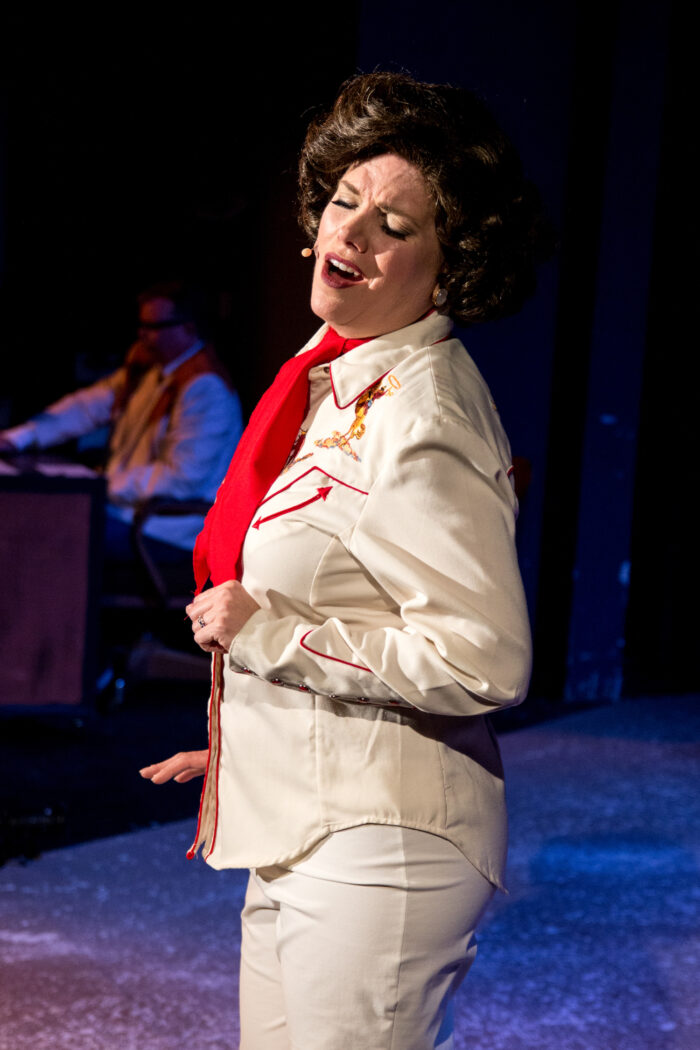Review: ALWAYS...PATSY CLINE at Simi Valley Cultural Arts Center
Michele McRae's stunning portrayal of the late country star runs through December 19 in Simi Valley

When producers of country music decided to try and appeal to pop audiences sixty years ago, the main recipient of this shift to a more accessible sound was Patsy Cline, a rough-and-tumble, take-no-prisoners roadhouse singer with a voice that could melt the stoniest barfly in her hometown of Winchester, Virginia. Her meteoric rise to the top of the country charts beginning in 1957 marked the beginning of a whirlwind career that made her the Queen of the Nashville Sound, as the music was called. That is, until her tragic death at the age of 30 in a plane crash in March 1963, a shattering event that made her nation of fans weep.
Ever since, Patsy Cline's records never stopped selling. The lush brand of country music she sang has receded into the distance, but Cline's appeal continues to attract new listeners. The Decca album "Patsy Cline's Greatest Hits," issued in 1967, sold ten million copies by 2005. In 1998, playwright Ted Swindley created "Always...Patsy Cline," a jukebox musical celebrating Cline's music that is framed around the singer's friendship with Louise Seger, a Houston housewife who Cline befriended in 1961 after they met at a Texas honky-tonk. Seger and Cline kept in touch with a series of letters they wrote to each other, with each Cline letter ending with the phrase, "Love Always...Patsy Cline."
The musical, which is playing at the Simi Valley Cultural Arts Center through December 19, features two remarkable performers: Michele McRae as Cline and Kathleen Silverman as Seger. The Florida-born McRae has appeared in a number of musicals, but her portrayal of Cline is stunning. In addition to her physical resemblance to Cline, McRae has done her homework, adopting, without mimicking, Cline's distinctive vocal mannerisms so perfectly that the effect is magical.

Michele McRae as Patsy Cline (courtesy Simi Valley Cultural Arts Center)
McRae knows all of Cline's moods, from the rambunctious early rockabilly hits like "Gotta Lot of Rhythm" to her sensuous recordings of Don Gibson's "Sweet Dreams" and Willie Nelson's "Crazy." Cline was a stylist, able to reframe artist's songs, such as Hank Williams' "Your Cheatin' Heart" and Bob Wills' "San Antonio Rose" into her own voice. It didn't matter whether the song was a country standard or Cole Porter's heartbreakingly beautiful "True Love," Cline stamped each with her own style. "Always...Patsy Cline" not only features Cline's familiar hits, but Swindley also took a deep dive into Cline's catalog, summoning forth underappreciated songs like the waltz/ballad "If I Could See the World" and "Three Cigarettes In an Ashtray."
Joining McRae is character actress Kathleen Silverman, who revels in portraying colorful personalities like Louise Seger. Sporting a beehive hair-do, slacks, and a "kiss my grits" accent, Silverman comes off as a wisecracking Minnie Pearl, reading letters the "gal pals" sent to one another and reminiscing about their friendship, even singing harmony with McRae on Bill Monroe's "Blue Moon of Kentucky."
Despite the brilliance of McRae and Silverman's performance, the show fails to tell us anything about Cline's personality, how she mentored and served as a surrogate big sister to an aspiring 19-year-old Loretta Lynn, about her tempestuous love affair with her second husband, Charlie Dick, or details of a traumatic automobile accident in 1961, a head-on collision that left her hospitalized for a month. For the rest of her short life, Cline hid facial scars sustained in the accident by wearing wigs, makeup and bandanas during performances.
The show features period-accurate costumes that complete the illusion, exquisitely designed by Ken Patton, who drew from photographs of Cline from record album covers, publicity stills and filmed appearances. A quartet of musicians calling themselves the Bodacious Bobcats, backed Cline throughout the performance. The arrangements are simple, with no flourishes by stellar sidemen like Nashville studio stalwarts Grady Martin or Hank Garland, who played on Cline's Decca sessions, although pianist Paul Duffy does a fair job of representing Owen Bradley's distinctive piano style. Although Cline used traditional country instruments such as fiddle and steel guitar on her early records, the on-stage band featured only guitar (Gabe Gonzalez), bass (John Brinkman), and drums (Adam Kuns). The printed program credits fiddler Ray Dean Mize, who was absent due to illness on the day we saw the show.
Though not a biography, "Always...Patsy Cline" serves its purpose well, to bring to life one of country music's most distinctive voices. And for that, we are grateful.
"Always...Patsy Cline" plays through December 19 at the Simi Valley Cultural Arts Center. For tickets, visit www.simi-arts.org.
Reader Reviews
Videos

